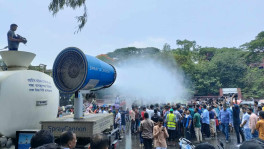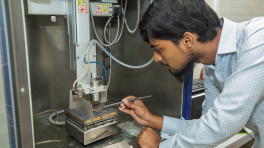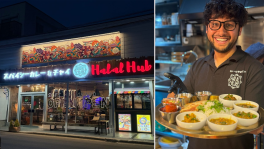Footpath shops make visiting Sher-e-Bangla Nagar hospitals harder
Patients receiving treatment at Nitor said they are forced to buy necessary things from the footpath shops as there is none inside the hospital

Mohammad Ismail's family members brought him to the National Institute of Traumatology and Orthopedic Rehabilitation (Nitor) last week as he had his leg broken in an accident, but they had to get down from the rickshaw far from the hospital because the road leading to it was unusable due to ongoing development work.
To make the situation worse, Ismail's family members had to carry him along the broken road – not by the footpath, because it was occupied by hundreds of shops.
Ismail's son Jahangir told The Business Standard that they risked breaking their own legs by falling into a ditch when they were carrying Ismail along the broken road. Besides, it took them some time to find the hospital's main gate, hidden as it was behind the shops.
Over 300 illegal establishments, including restaurants, medical accessory shops, pharmacies, fruit shops and groceries, are occupying the road and sidewalk in front of Nitor and the Bangladesh Shishu Hospital and Institute, located in the Sher-e-Bangla Nagar area of the capital. Four shops have also been occupying the passenger shed in the area.
Traffic jams prevail in the area because of the illegal shops, making it difficult for critical patients to reach the hospitals there.
Mahfuzul Hoque, administrative officer of Nitor, told TBS, "We have written many times to the Dhaka North City Corporation to clear the footpath, but they have not taken any significant action. It evicted the shop owners a couple of times but they have always returned."
"When we tried to clear the sidewalk with the Ansar forces deployed here, the shop owners protested, saying that they were occupying the city corporation's properties and footpaths where the hospital has no authority. We did not get any remedy even by complaining to the police."
Faridur Rahman Khan, councillor of Ward-27 under Dhaka North where the hospitals are located, told TBS, "We conducted drives to demolish the shops at different times but they returned without fail. I have been attacked a number of times while conducting these drives.
"The Public Works Department (PWD) owns the land along with the footpath. Traders set up shops there and occupy the footpath as well. It is not possible for us alone to clear the footpath if the PWD does not take any action."
One of the shop owners, Md Sabuj, told TBS he sells various medical equipment like bandages and anklets, which are essential for treating patients coming to the hospital.
"Many others have set up shops by occupying this footpath, so I have set up one too. I have been here for 12 years. The authorities evict me two to three times every year, but I have returned again and again. If the authorities provide designated space for our shops, then we will not occupy footpaths illegally," said Sabuj.
Mainuddin, owner of a food stall on the footpath, also told TBS, "We would have left the sidewalk if we could get a specified space. We ourselves know that our shops are creating problems, but we can do nothing about it because we earn a living by these."
Shamim, a fruit seller in the area, told TBS, "Footpath shops mainly benefit patients and their relatives who are our main customers. Vehicles moving on the road do not face much problem for us either. Besides, a concentration of different establishments is a common sight in front of hospitals everywhere in the country."
Tarek Jameel, an employee of Agargaon Pharmacy built inside the passenger shed on the footpath in front of the hospital, said the drug shop was legal and the city corporation collects rent from it every month. Besides, the pharmacy owner claimed that he has secured a court order which prohibits its demolition.
Shiblu Rahman, relative of a patient receiving treatment at Nitor, told TBS that they are forced to buy necessary medical accessories from the shops on the footpath as there is no pharmacy or shop inside the hospital.
Patients coming to Nitor and Shishu Hospital alleged that they are frequently cheated as the shops charge excessive prices for poor quality products.
Sabina Haque, whose brother received treatment at Nitor, told TBS that she needed a stretcher to take him home after treatment, so she had to buy a stretcher from a shop in front of the hospital. But it was made with such poor material that it broke even before they reached home.


 Keep updated, follow The Business Standard's Google news channel
Keep updated, follow The Business Standard's Google news channel















